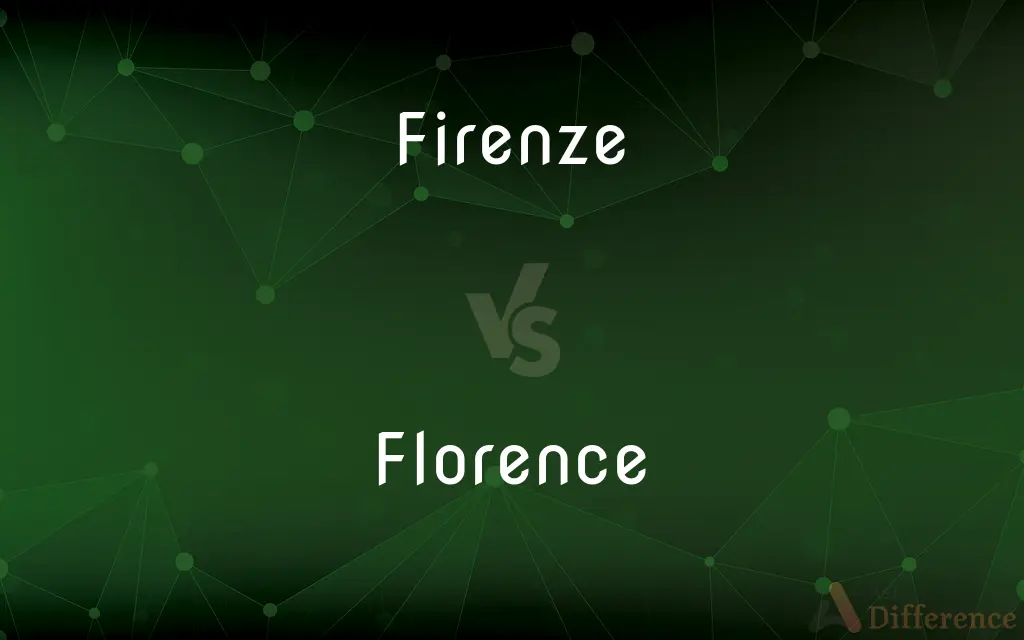Firenze vs. Florence — What's the Difference?
Edited by Tayyaba Rehman — By Maham Liaqat — Updated on March 25, 2024
Firenze is the Italian name for Florence, a city in Italy known for its rich history and art. Florence is the English adaptation of the name, widely recognized internationally.

Difference Between Firenze and Florence
Table of Contents
ADVERTISEMENT
Key Differences
Firenze and Florence refer to the same city, distinguished primarily by language: Firenze is used in Italian, while Florence is its English counterpart. This linguistic difference mirrors the city's global recognition and cultural significance, embodying its historical and artistic heritage from two perspectives.
The city, regardless of the name used, is renowned for its contributions to art, architecture, and the Renaissance. Firenze emphasizes the city's Italian heritage and identity, resonating with the local language and cultural nuances. On the other hand, Florence is how the international community refers to this iconic city, making its cultural and historical treasures accessible to a broader audience.
The use of Firenze within Italy and among Italian speakers highlights a connection to the city's local traditions and linguistic identity. In contrast, the English name Florence facilitates global engagement and discussion, bridging cultural and linguistic gaps to celebrate its universal value.
Moreover, the naming convention extends beyond mere linguistic preference, influencing how the city's cultural assets are perceived and appreciated worldwide. While Firenze might evoke a more authentic or traditional perspective among Italians, Florence encompasses the city's global image and appeal, reflecting its significance in world history and culture.
The choice between Firenze and Florence can also reflect an individual's familiarity with Italian culture or their relationship with the city. For tourists and international discourse, Florence is more commonly used, while Firenze might be preferred by those seeking to emphasize or respect the city's Italian roots.
ADVERTISEMENT
Comparison Chart
Language
Italian
English
Context of Use
Used in Italy and among Italian speakers.
Used internationally, outside Italy.
Cultural Connection
Emphasizes local Italian heritage and identity.
Highlights the city's global recognition and cultural significance.
Perception
May convey authenticity and traditional Italian culture.
Facilitates global engagement and appreciation of the city's contributions.
Use in Communication
Preferred by those emphasizing Italian cultural roots.
Commonly used in international discourse and by tourists.
Compare with Definitions
Firenze
Used in Italy.
Visiteremo Firenze quest'estate.
Florence
International recognition.
The Uffizi Gallery in Florence attracts tourists worldwide.
Firenze
Italian name for Florence.
Firenze è famosa per la sua arte rinascimentale.
Florence
English name for Firenze.
Florence is known for its Renaissance art.
Firenze
Reflects local heritage.
Nel cuore di Firenze, si trova il Duomo.
Florence
Bridging cultures.
Florence's history is a testament to the exchange of cultural values.
Firenze
Symbol of Italian culture.
Firenze ospita alcune delle opere più note di Leonardo da Vinci.
Florence
Used outside Italy.
We're planning a trip to Florence next summer.
Firenze
Linguistic identity.
Gli abitanti di Firenze sono chiamati Fiorentini.
Florence
Global cultural icon.
Florence is home to some of Leonardo da Vinci's most famous works.
Firenze
A city in central Italy on the Arno; provincial capital of Tuscany; center of the Italian renaissance from 14th to 16th centuries
Florence
Florence ( FLORR-ənss; Italian: Firenze [fiˈrɛntse] (listen)) is a city in Central Italy and the capital city of the Tuscany region. It is the most populated city in Tuscany, with 383,084 inhabitants in 2013, and over 1,520,000 in its metropolitan area.Florence was a centre of medieval European trade and finance and one of the wealthiest cities of that era.
Florence
An ancient gold coin of the time of Edward III., of six shillings sterling value.
Florence
A kind of cloth.
Florence
A city in central Italy on the Arno; provincial capital of Tuscany; center of the Italian renaissance from 14th to 16th centuries
Florence
A town in northeast South Carolina; transportation center
Common Curiosities
Why are there two names for the city?
The difference in names reflects the linguistic translation from Italian to English, catering to local and international audiences.
Is Firenze or Florence more correct?
Both are correct, depending on the linguistic and cultural context of the speaker.
Does the city's name change its cultural significance?
The cultural significance remains, though the name used can reflect different perspectives or connections to the city.
What are some must-see attractions in Florence/Firenze?
Key attractions include the Uffizi Gallery, Duomo, and Ponte Vecchio.
What is the difference between Firenze and Florence?
Firenze is the Italian name, and Florence is the English version, both referring to the same city in Italy.
Can I use Firenze when speaking in English?
While you can, Florence is more widely recognized and understood in English-speaking contexts.
Why is Florence important in history?
Florence is celebrated for its pivotal role in the Renaissance, housing significant art, architecture, and historical figures.
Are there other cities with different Italian and English names?
Yes, many Italian cities have different names in English, such as Roma (Rome) and Venezia (Venice).
How does the name used affect perception of the city?
Firenze might evoke a sense of authenticity and tradition, whereas Florence can be seen as making the city's heritage more accessible globally.
How do locals refer to their city?
Locals refer to it as Firenze, reflecting their linguistic and cultural identity.
Does the academic community prefer Firenze or Florence?
The preference can vary based on context, though English publications tend to use Florence.
How do language and culture influence the city's name?
They shape the name's use and perception, reflecting either a global or local perspective.
How does knowing both names for the city benefit travelers?
It enhances understanding and appreciation of the city's global and local cultural significance.
Is there a difference in the way tourists and locals perceive the city?
Tourists may view the city through the lens of its global cultural contributions, while locals might have a deeper connection to its Italian heritage.
Why is Florence/Firenze considered a symbol of the Renaissance?
Its art, architecture, and historical figures played a central role in the Renaissance movement.
Share Your Discovery

Previous Comparison
Hazard vs. Danger
Next Comparison
Glacier vs. IcebergAuthor Spotlight
Written by
Maham LiaqatEdited by
Tayyaba RehmanTayyaba Rehman is a distinguished writer, currently serving as a primary contributor to askdifference.com. As a researcher in semantics and etymology, Tayyaba's passion for the complexity of languages and their distinctions has found a perfect home on the platform. Tayyaba delves into the intricacies of language, distinguishing between commonly confused words and phrases, thereby providing clarity for readers worldwide.
















































